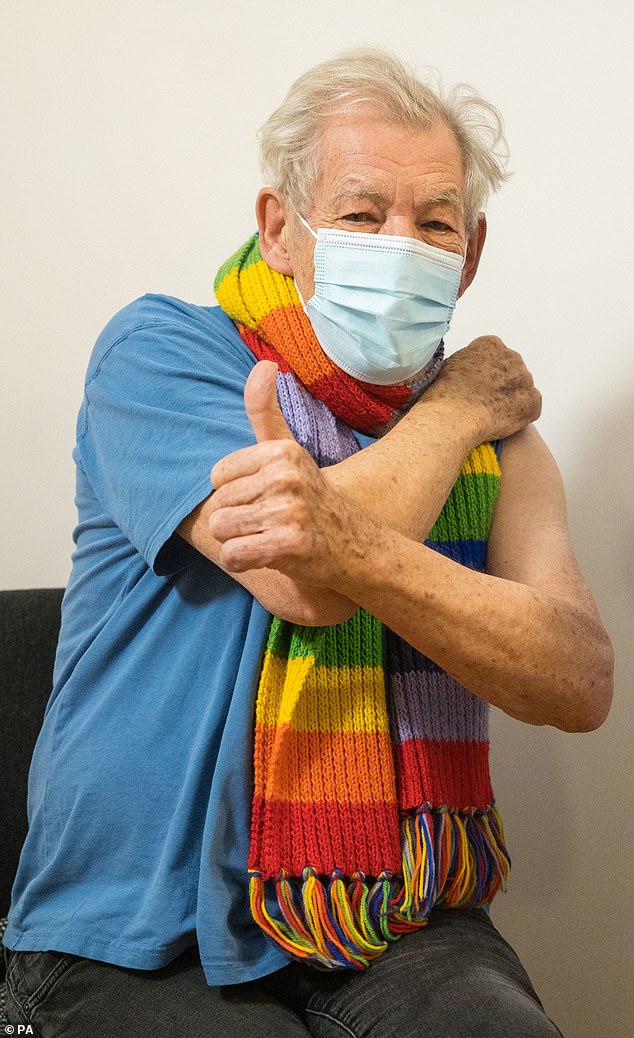‘I feel euphoric!’ Sir Ian McKellen, 81, safely receives COVID-19 vaccine as part of the UK’s priority category… admitting he feels ‘very lucky’
- The actor is one of thousands of over-80s in the UK to be sent to the front of the queue to receive the Pfizer vaccination
- He joins other stars in being vaccinated, such as Prue Leith and Michael Whitehall
- Others in the priority category include NHS workers and care home staff
- Sir Ian said on Wednesday: ‘It’s painless… it’s convenient, and getting in touch and meeting NHS staff and saying thank you to them is a bonus!’
- He added: ‘I would have no hesitation in recommending it to anyone’
- The country-wide vaccination programme is the largest in NHS history and is already in its second week
Sir Ian McKellen CBE has safely received the COVID-19 vaccine after the NHS launched its vaccine roll-out earlier this month.
The veteran British actor, 81, forms part of the first eligible groups for the vaccine and joins the thousands of over 80s, NHS staff, and care home staff who have been called upon by the NHS to attend their local GP practice or vaccination centre to be treated.
He joins other stars in being vaccinated, such as Prue Leith and Michael Whitehall.
Vaccinated: Sir Ian McKellen CBE, 81, has safely received the Covid-19 vaccine after the NHS launched its vaccine rollout earlier this month
After getting the vaccine at the Arts Research Centre, Queen Mary University Hospital, Sir Ian said: ‘It’s a very special day, I feel euphoric!’
He went on: ‘Anyone who has lived as long as I have is alive because they have had previous vaccinations.
‘The take-up amongst the older generation will be 100 per cent – it ought to be – because you’re having it not just for yourself but for people who you are close to – you’re doing your bit for society.
‘Of course, it’s painless… it’s convenient, and getting in touch and meeting NHS staff and saying thank you to them for how hard they’ve been working is a bonus.
‘I would have no hesitation in recommending it to anyone. I feel very lucky to have had the vaccine.’
The vaccine is the biggest breakthrough since the pandemic began, potentially saving tens of thousands of lives.
The country-wide vaccination programme is the largest in NHS history and is already in its second week.
Just like other routine vaccines, this works by teaching the immune system how to defend itself against attack.
The vaccine is given as an injection into the upper arm and is given as 2 doses, at least 21 days apart.
An effective vaccine will be the best way to protect the most vulnerable from COVID-19 and the UK’s roll out only began when the Pfizer vaccine, which has been trialled on around 45,000 people, was confirmed to have met the strict standards of safety, quality and effectiveness set out by the independent Medicines and Healthcare products Regulatory Agency (MHRA), which enabled it to be given to the public.
Dr Nikki Kanani, NHS England Medical Director for Primary Care, said: ‘The NHS has made an excellent start to rolling out the COVID-19 vaccine across the country, with dozens of hospitals and now hundreds of local vaccination services offering the vaccine to those who need it most.
‘This is a huge step forward in the fight against coronavirus, but everyone should continue to follow all guidance to control the spread of the virus.’
The UK’s vaccination programme will build up steadily in the weeks and months ahead and will gradually be extended to more and more people in order of age and risk.
To help, people must wait to be contacted – the NHS will let people know when it’s their turn to have the vaccine.
